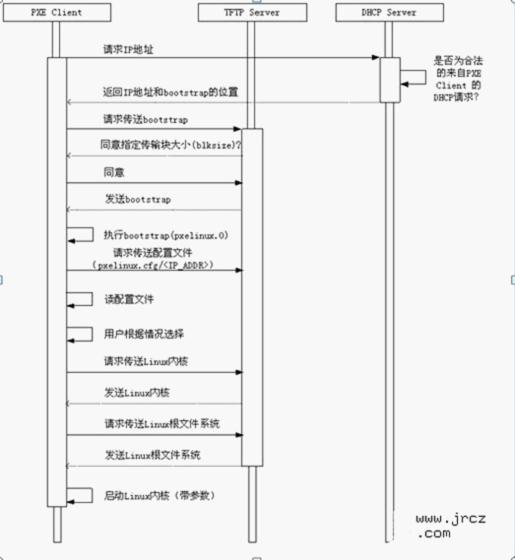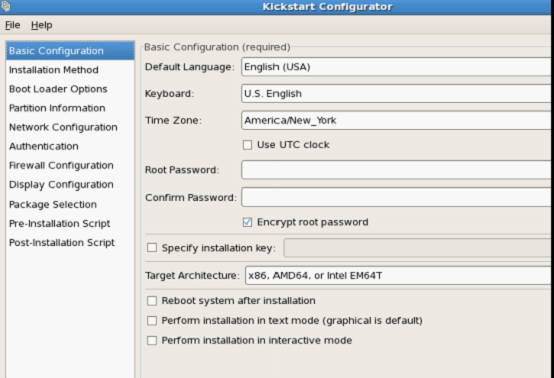KickStart安装教程
2015-06-11 06:25
441 查看
KickStart安装教程
PXE概念介绍:
KickStart概念介绍:
KickStart流程:
大体流程:DHCP(获取IP,寻找TFTP)>TFTP(交换获取开机启动文件 /tftpboot即此文件夹)>HTTP(加载安装文件)>本地安装
详细流程图:

安装过程:
一、关闭了selinux iptables
更改成 SELINUX=disabled
二、配置yum源以及用yum安装
挂载Linxu iso镜像
三、配置tftp加载文件
开机启动:
#disable的直由yes变为no
加载FTP文件:
四、配置dhcp文件
五、配置KickSyack自动安装配置文件
图形界面配置:
Shell配置:参考代码区进行修改。

六、后续工作重启服务以及开机启动
代码:
FAQ:
问1:第一段提示硬盘空间不够。
答1:升级空间即可。
问2:提示虚拟磁盘空间无法读取。
答2:需要点击确定就OK,物理硬盘不存在此问题。

DHCP介绍:
ddns-update-style interim:这个是动态获取IP地址啦。必须放在第一项哇。
ignore client-updates:服务端与客户端传输相关
Subnet:获取IP段,要配置正确。
Routers:是路由地址
Range:dhcp分配IP段。
next-server:是tftp地址。
Allow booting bootp:放行传输和协议。
TFTP介绍:
Default:用在于tftp建立传输入协议后会去tftpboot里找文件,啥都找不着之后就会找default。
tftp-server :这个是用来传送引导文件的,
Initrd.img/vmlinux: 看用来安装前的一些工作。但tftp是用来传输这些文件的协议。
网络结构:
如图为网络安装环境的一个原理示意,安装环境由一个局域网和连接到该局域网的启动服务器、安装服务器和待安装客户端,其中启动服务器和安装服务器可以部署在同一台物理机上。
服务相关作用:
Dhcpd: 分发IP地址。
Tftpd: 分发启动文件安装。
Httpd:分发系统文件安装。
参考地址:
http://os.51cto.com/art/201009/223294.htm
http://blog.sina.com.cn/s/blog_94717ebc01010wio.html
PXE概念介绍:
| PXE技术与RPL技术不同之处为RPL是静态路由,PXE是动态路由。RPL是根据网卡上的ID号加上其他记录组成的一个Frame(帧)向服务器发出请求。而服务器中已有这个ID数据,匹配成功则进行远程启动。PXE则是根据服务器端收到的工件站MAC地址,使用DHCP服务为这个MAC地址指定个IP地址。每次启动可能同一台工作站有与上次启动有不同的IP,即动态分配地址。下以客户端引导过程说明PXE的原理。 (1)客户端开机后,PXE BootROM(自启动芯片)获得控制权之前执行自我测试,然后以广播形式发出一个请求FIND帧。 (2)如果服务器收到客户端所送出的要求,就会送回DHCP回应,包括用户端的IP地址、预设通信通道,以及开机映像文件;否则服务器会忽略这个要求。 (3)客户端收到服务器发回的响应后则会回应一个帧,以请求传送启动所需文件,并把自己的MAC地址写到服务器端的Netnames.db文件中。 (4)将有更多的消息在客户端与服务器之间应答,用于决定启动参数。BootROM由TFTP通信协议从服务器下载开机映像文档。客户端使用TFTP协议接收启动文件后,将控制权转交启动块以引导操作系统,完成远程启动。 |
| KickStart是一种无人职守安装方式。KickStart的工作原理是通过记录典型的安装过程中所需人工干预填写的各种参数,并生成一个名为ks.cfg的文件;在其后的安装过程中(不只局限于生成KickStart安装文件的机器)当出现要求填写参数的情况时,安装程序会首先去查找KickStart生成的文件,当找到合适的参数时,就采用找到的参数,当没有找到合适的参数时,才需要安装者手工干预。这样,如果KickStart文件涵盖了安装过程中出现的所有需要填写的参数时,安装者完全可以只告诉安装程序从何处取ks.cfg文件,然后去忙自己的事情。等安装完毕,安装程序会根据ks.cfg中设置的重启选项来重启系统,并结束安装。 |
大体流程:DHCP(获取IP,寻找TFTP)>TFTP(交换获取开机启动文件 /tftpboot即此文件夹)>HTTP(加载安装文件)>本地安装
详细流程图:

安装过程:
一、关闭了selinux iptables
| vim /etc/sysconfig/selinux |
| service iptables stop chkconfig iptables off |
| yum install -y httpd* tftp-server-* xinetd-* system-config-kickstart-* syslinux dhcp* |
| mount /dev/cdrom /mnt cp -rf /mnt/* /var/www/html/ |
开机启动:
| vi /etc/xinetd.d/tftpdisable = no |
加载FTP文件:
| cd /tftpboot/cp /usr/lib/syslinux/pxelinux.0 /tftpboot cp /var/www/html/images/pxeboot/initrd.img /tftpboot cp /var/www/html/images/pxeboot/vmlinux /tftpboot cp /var/www/html/images/pxeboot/vmlinux /tftpboot mkdir pxelinux.cfg cp /var/www/html/isolinux/isolinux.cfg /tftpboot/default |
| vim /etc/dhcpd.conf |
| # # DHCP Server Configuration file. # see /usr/share/doc/dhcp*/dhcpd.conf.sample ddns-update-style interim; ignore client-updates; subnet 192.168.10.0 netmask 255.255.255.0 { option routers 192.168.10.1; option subnet-mask 255.255.255.0; range 192.168.10.100 192.168.10.200; next-server 192.168.10.85; filename "pxelinux.0"; allow booting; allow bootp; } |
图形界面配置:
| #system-config-kickstart |

六、后续工作重启服务以及开机启动
| service httpd restart service xinetd restart service dhcpd restart chkconfig httpd on chkconfig xinetd on chkconfig dhcpd on |
| [root@wh-kickstart-100-60 ~]# vim /tftpboot/pxelinux.cfg/default |
| default linux prompt 0 timeout 10 display boot.msg F1 boot.msg F2 options.msg F3 general.msg F4 param.msg F5 rescue.msg label linux kernel vmlinuz append initrd=initrd.img ks=http://192.168.100.60/ks.cfg label text kernel vmlinuz append initrd=initrd.img text label ks kernel vmlinuz append ks initrd=initrd.img label local localboot 1 label memtest86 kernel memtest append - |
| [root@wh-kickstart-100-60 ~]# vim /etc/dhcpd.conf |
| # # DHCP Server Configuration file. # see /usr/share/doc/dhcp*/dhcpd.conf.sample # ddns-update-style interim; ignore client-updates; subnet 192.168.100.0 netmask 255.255.255.0 { option routers 192.168.100.1; option subnet-mask 255.255.255.0; range 192.168.100.100 192.168.100.200; next-server 192.168.100.60; filename "pxelinux.0"; allow booting; allow bootp; } |
| [root@wh-kickstart-100-60 ~]# vim /var/www/html/ks.cfg |
| #platform=x86, AMD64, or Intel EM64T # System authorization information auth --useshadow --enablemd5 # System bootloader configuration bootloader --location=mbr # Partition clearing information clearpart --none # Use graphical install graphical # Firewall configuration firewall --enabled # Run the Setup Agent on first boot firstboot --disable # System keyboard keyboard us # System language lang en_US # Installation logging level logging --level=info # Use network installation url --url=http://192.168.100.60/ # Network information network --bootproto=dhcp --device=eth0 --onboot=on #Root password rootpw --iscrypted $1$vraKvWxT$xevNz205XcKgz8pnf43BV1 # SELinux configuration selinux --disabled # System timezone timezone Asia/Shanghai # Install OS instead of upgrade install # X Window System configuration information xconfig --defaultdesktop=GNOME --depth=8 --resolution=640x480 # Disk partitioning information part / --bytes-per-inode=4096 --fstype="ext3" --size=4096 part /boot --bytes-per-inode=4096 --fstype="ext3" --size=100 part swap --bytes-per-inode=4096 --fstype="swap" --size=1024 part /home --bytes-per-inode=4096 --fstype="ext3" --grow --size=1 %packages @gnome-desktop |
问1:第一段提示硬盘空间不够。
答1:升级空间即可。
问2:提示虚拟磁盘空间无法读取。
答2:需要点击确定就OK,物理硬盘不存在此问题。

DHCP介绍:
ddns-update-style interim:这个是动态获取IP地址啦。必须放在第一项哇。
ignore client-updates:服务端与客户端传输相关
Subnet:获取IP段,要配置正确。
Routers:是路由地址
Range:dhcp分配IP段。
next-server:是tftp地址。
Allow booting bootp:放行传输和协议。
TFTP介绍:
Default:用在于tftp建立传输入协议后会去tftpboot里找文件,啥都找不着之后就会找default。
tftp-server :这个是用来传送引导文件的,
Initrd.img/vmlinux: 看用来安装前的一些工作。但tftp是用来传输这些文件的协议。
网络结构:
如图为网络安装环境的一个原理示意,安装环境由一个局域网和连接到该局域网的启动服务器、安装服务器和待安装客户端,其中启动服务器和安装服务器可以部署在同一台物理机上。
服务相关作用:
Dhcpd: 分发IP地址。
Tftpd: 分发启动文件安装。
Httpd:分发系统文件安装。
参考地址:
http://os.51cto.com/art/201009/223294.htm
http://blog.sina.com.cn/s/blog_94717ebc01010wio.html
相关文章推荐
- 项目的大小衡量标准,以及项目演进的方法(填空架子,持续集成,边开发边测试效果)
- NABCD分析
- latex的三线表格及一些错误的修改
- 关于ruby on rails测试的一些笔记
- E-prime debug
- Sum Root to Leaf Numbers
- rails日记1
- Algorithms
- android 时间戳与日期格式的互相转换 以及 自定义选择器
- iOS开发零基础教程之真机调试流程
- MongoVUE模糊查询,更新单个字段
- leetcode 203 -- Remove Linked List Elements
- 天题系列:Word Ladder II
- Server 2012域控制器显示网络为“公用网络”
- Android学习十二:跑马灯程序实现(简单联系)
- 前台JavaScript根据回车和控件ID调用后台函数
- 量子时空观与黑洞研究
- Java基本数据类型及其封装类
- windows8安装msi软件提示2503错误的解决办法
- 浅析数据库连接池(一)
